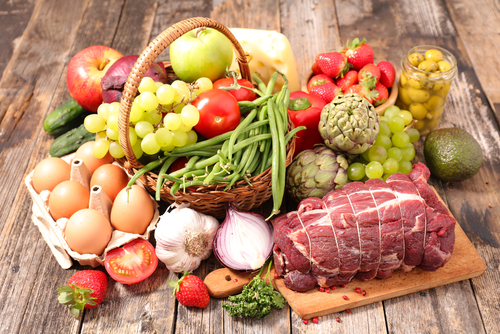Organic means that foods come from pesticide and herbicide free plant sources or naturally raised animals.
Some crops are more heavily treated than others.
25 Most Important Foods to Buy Organic
Baby foods: Because infants are more sensitive to pesticides, have more vulnerable nervous and immune systems.
Strawberries: Are the most heavily contaminated produce item; found to have the highest level of hormone effecting pesticides. Out of season, strawberries are heavily treated.
Milk and butter: As pesticides are pervasive and stored in higher amounts in fat, they retain higher levels of residue and chemicals from feeds. Milk is a common source of Atrazine (a known endocrine disrupter) and BGH (a growth hormone).
Bananas: Despite their thick skin, as they are shipped from tropical countries or southern, they are commonly gassed with ethylene to ripen them and prepare them for shipping. They are also fumigated to prevent any pest.
Stone fruits: (Peaches, cherries apricots, plums and nectarines): often sprayed because their sweet attracts insects. But Stone fruits have skin that absorbs easily, so they tend to retain more of the chemicals.
Leafy greens: (Lettuce, spinach, kale, chard) : are potentially more harmful because we eat the leafy greens.
Grapes: Receive multiple applications of chemical agents during their growing period.
Green beans: More than 60 pesticides are used on green beans.
Apples: Nearly as contaminated as strawberries, so if you buy non/organic apples make sure to peel them.
Rice: The rice fields needs constants water, many herbicides and insecticides are water soluble and contaminate the ground water near the field. as it’s one of the most frequently consumed on the planet and so part of your diet, buy it organic in bulk (it will be cheaper).
Corn: It’s typically heavily treated.
Bell Peppers: Chemical use are the most neurotoxic pesticides.
Tomatoes: Skins of tomatoes are thin and absorbent. they are easily grown at home even on the side of the window.
Tropical fruits: (Pineapples, papayas, mangoes): usually heavily treated during cultivation, preparation and shipping because they are attractive to tropical pests.
Celery: it’s an absorptive watery vegetable; retains more pesticides than any other crop.
Berries: (Raspberries, blueberries, black berries): the same as strawberries, have high pesticide exposure.
Imported produce: Often heavily treated for easier shipping.
Cruciferous vegetables: (broccoli, cabbage, brussel sprouts, cauliflower): a tricky vegetable >>> usually known as the anti cancer food, high in fiber with low cal, so really often on the menu BUT the main part we eat is sprayed with carcinogenic chemicals, so really go organic.
Cucumber: Dieldrin, a cancer risk increaser insecticide is commonly found on the non organic, as well as chemical residues on the waxes to make them shiny.
Wheat: Is treated with pesticides. Bran and Germ retain more residue, so please keep in mind it might be worse to eat non organic whole wheat than non organic wheat.
Eggs: Factory farm eggs are lower nutrients and hens live in unhygienic condition. The best option is really organic eggs.
Seafood: It can be polluted by the water, even in rivers and lakes where there can be heavy metals.
Meat: To gain muscle mass, animals are array with antibiotics, hormones and steroids & their living conditions and sanitary conditions are usually bad.
Coffee: This daily drink is often heavily treated with chemicals. Please get organic coffee especially if you are a heavy drinker.
Wines: Last but not least: Grapes and wine contain lots of different accumulated pesticides. Even non organic wines contain sulfites (try to find organic without any chemicals especially if you are sensitive like asthmatics to avoid side effects).
Even if organically grown foods cannot be totally screened for ecological drift or pollutants, the quality of organic foods is outstanding in comparison to non organic.
Several studies show that organically grown foods have higher nutrient levels than the same produce grown commercially. The processing of foods greatly diminishes the level of nourishment.
Below is a powerful Recipe: (of course with organic products)
Vitality Red Salad
Prep time: 10 minutes
Serves: 6-8
Ingredients
- 500gr strawberries
- 500gr cherry tomatoes
- 10 basil leafs
- 1 tablespoon olive oil
- 1 tablespoon balsamic vinegar
- Himalayan salt
- Pepper
Directions
- Cut the strawberries and tomatoes in 4.
- In a bowl mix oil, vinegar, salt, pepper, add tomato and strawberries and basil leaf.
Enjoy it as a starter in a glass or as a side dishes.
You will have a lot’s of success!


